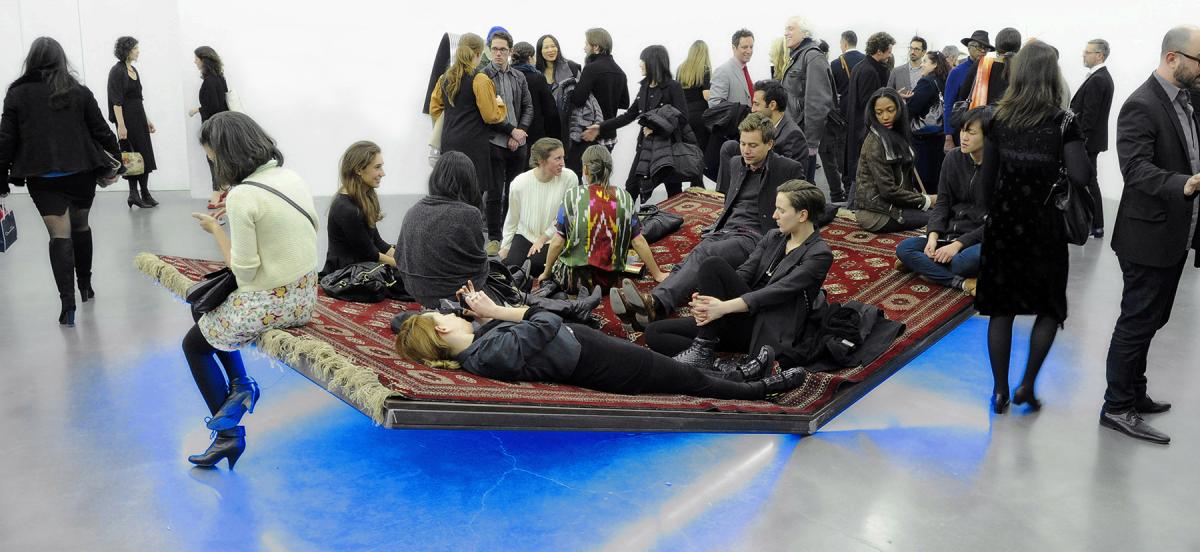Pew Center Grant Funds Project Exploring Connections Between Campus and Local and International Muslim Communities

The installation view of Slavs and Tatars' Prayway (2012) at New Museum in New York. Photo: Patrick McMullan.
Details
The award connects the College’s Hurford Center for the Arts and Humanities, artist collective Slavs and Tatars, and Philadelphia nonprofits Twelve Gates Arts and the Council on American Islamic Relations for two years of planned artistic collaborations inspired by a 14th-century allegorical Uighur text.
When The Pew Center for the Arts & Heritage announced its 2019 grants in support of the Philadelphia region’s cultural organizations, a Haverford College academic center was on the list of recipients for the first time. The John B. Hurford ’60 Center for the Arts and Humanities (HCAH) was one of 27 organizations receiving support from the Pew Center this year for its project The Contest of the Fruits, a collaboration with Berlin-based artist collective Slavs and Tatars and two local nonprofits: the Old City gallery space Twelve Gates Arts and the Philadelphia chapter of the Council on American Islamic Relations.
The Haverford team behind the grant was “euphoric” to discover they’d been selected, according to Koshland Director of HCAH Ken Koltun-Fromm. Over the next two years, they will use the $285,000 grant to fund an original animated film, a series of public programs, a semester-long campus artist residency by Slavs and Tatars, an exhibit in the campus Cantor Fitzgerald Gallery, and the publication of a book, all of which use The Contest of the Fruits, a 14th-century allegorical text, as its inspiration.
It is an ambitious slate of programming, and “support from The Pew Center for Arts & Heritage will enable both a wider-reaching and deeper engagement than we would otherwise be able to achieve,” said Matthew Callinan, associate director of the Cantor Fitzgerald Gallery, VCAM, and campus exhibitions.
The project, which grew out of the ongoing, collaborative research between Slavs and Tatars and Haverford Assistant Professor of Religion Guangtian Ha, aims to use art as a conduit to enable communities to gather in unfamiliar spaces and to experience the challenges of border crossings.
“We want our students and colleagues to engage the Philadelphia art scene and to see how the Cantor Fitzgerald Gallery connects to that scene,” said Koltun-Fromm, who is also the Robert and Constance MacCrate Chair in Social Responsibility and a professor of religion. “By partnering with Twelve Gates and CAIR, we can overcome boundaries that we have unwittingly developed between the Main Line and the city, and we want to encourage crossing borders in this project.”
The Contest of the Fruits is the tale of a competition between the mulberry, pomegranate, quince, and pear, written in Uighur—a Turkic language mainly spoken by the Muslim ethnic minority group of western China. For the collaborators of the similarly named Pew Center-supported project, it is a starting point for questions around the fluidity of Islamic identity: How does one move across geographical and linguistic borders to create heritage, culture, and identity? How do we artistically materialize terms and worldviews that crossover and defy borders?
The two-year collaboration will begin right away. Slavs and Tatars, whose practice combines scholarly research and humor to investigate a region they define as being “between the former Berlin Wall and the Great Wall of China,” will be on campus and downtown at Twelve Gates Arts and CAIR later this month. They will return in April 2020 to begin work on the animated film and exhibition and to offer two public lectures at each of the project’s Philadelphia partner organizations, both of which will be followed by a communal meal to cultivate interchange and critical commentary. During spring 2021, the artist collective will spend the entire semester at the College, co-teaching a course with Ha and presenting a three-month-long exhibition in the Cantor Fitzgerald Gallery. A book chronicling the collaboration will follow.
“The project brings partners and communities together in the United States, Europe, and South America in facilitating new conversations and creations and this type of inclusive collaborative experience is one that's not only important to model, but to engage students in at an institution such as Haverford,” said Callinan. “We look forward to engaging with Haverford students both on-campus and off in partnership with our community partners in Philadelphia who will host numerous events over the duration of the project.”



